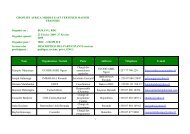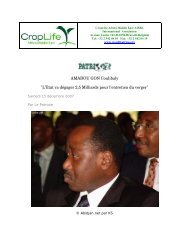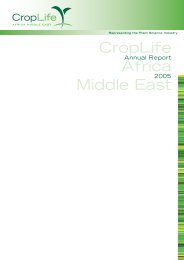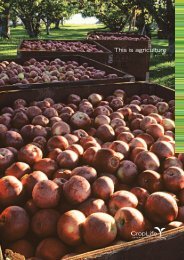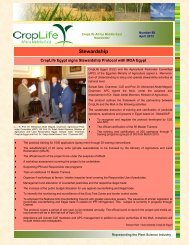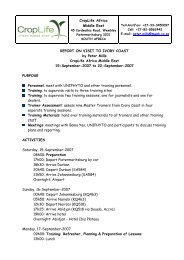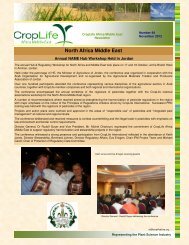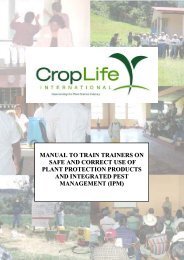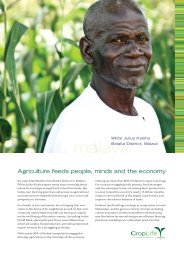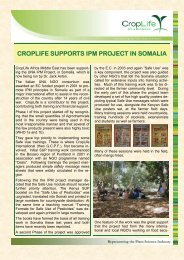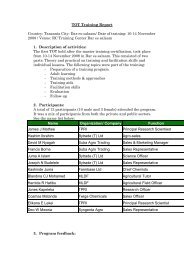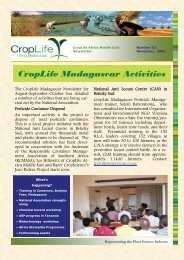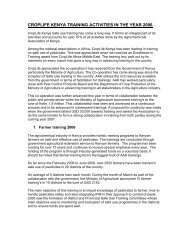Newsletter January 2013 - CropLife Africa Middle East
Newsletter January 2013 - CropLife Africa Middle East
Newsletter January 2013 - CropLife Africa Middle East
You also want an ePaper? Increase the reach of your titles
YUMPU automatically turns print PDFs into web optimized ePapers that Google loves.
Page 4<br />
<strong>CropLife</strong> <strong>Africa</strong> <strong>Middle</strong> <strong>East</strong> <strong>Newsletter</strong> Number 86<br />
<strong>January</strong> <strong>2013</strong><br />
Intellectual Property Rights / Anti-Counterfeiting<br />
Anti-Counterfeiting Training of Customs Officers - Côte d’Ivoire<br />
Col Baillet, Regional Director of Customs in San-Pedro who<br />
attended the programme was presented a certificate (A)<br />
which he proudly displayed (B) to other participants.<br />
On 19 December, in San-Pédro, a South Western region of Côte<br />
d’Ivoire, 27 operational customs agents of whom 21 were from the<br />
San-Pédro Regional Directorate (city and neighboring cities), and 6<br />
from Man and Daloa regions, approximately 450 Km and 300 Km from<br />
San-Pedro respectively were trained.<br />
The training was a continuation of the rollout of the anti-counterfeiting<br />
course to sensitize customs authorities on the issue, and to provide<br />
knowledge and tools to combat the illegal trade in pesticides.<br />
San-Pédro is an important port for cocoa exports besides being the<br />
capital of the south western region, the largest cocoa growing area in<br />
Côte d’Ivoire. Both Man and Daloa are also important cocoa growing<br />
areas. Illegal pesticides are usually found in these 3 important cocoa<br />
growing regions whilst cocoa is a strategic crop for Côte d’Ivoire, the<br />
world’s largest producer and supplier of around 40% of dry cocoa<br />
beans. Combating illegal pesticides will improve cocoa productivity and<br />
quality thus impacting positively on the income of farmers and the<br />
economy of the country as a whole.<br />
The training was facilitated by Roger Yeboué, Master trainer of<br />
<strong>CropLife</strong> <strong>Africa</strong> <strong>Middle</strong> <strong>East</strong> and Executive Secretary of <strong>CropLife</strong> Côte<br />
d’Ivoire. The course was conducted using an interactive approach to<br />
ensure full participation of the participants. Discussions covered:<br />
• Pesticides and pesticide regulations in Côte d’Ivoire focusing on<br />
the registration procedures.<br />
• Basics on pesticides covering toxicity.<br />
• Reading a pesticide label.<br />
• Illegal and counterfeit pesticides with a focus on the impact on productivity and health, and financial and losses.<br />
• Inspection of shipping documents.<br />
Copies of the appropriate pesticide regulations related to the registration, production, and distribution of crop protection<br />
products as well as the list of registered products in the country was distributed to each participant.<br />
The Regional Director of Customs Services attended the full programme and at the end stressed the importance and value of<br />
the programme. The participants shared this view and requested that such programs be carried out often, allowing for frequent<br />
meetings and exchanges between the industry and the customs services. Bama Yao<br />
Participants focusing on the facilitator<br />
covering the issue of the illicit pesticides<br />
trade<br />
Representing the Plant Science Industry



